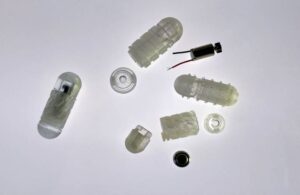
[Image from Felice Frankel/MIT]
Large-protein drugs generally can’t pass through the mucus barrier that lines the digestive tract. Insulin and most other “biologic drugs” with proteins or nucleic acids thus must be injected or administered in a hospital, according to MIT’s news website.
The researchers believe the new drug capsule developed at MIT could one day replace those injections. It features a robotic cap that spins. This helps it tunnel through the mucus barrier when it reaches the small intestine. Thus, drugs carried by the capsule can pass into the cells lining the intestine.
A study of the capsule appeared today in Science Robotics. The research demonstrates that the approach could deliver insulin as well as vancomycin, an antibiotic peptide that currently has to be injected.
Shriya Srinivasan, a research affiliate at MIT’s Koch Institute for Integrative Cancer Research and a junior fellow at the Society of Fellows at Harvard University, is the lead author of the study.
“By displacing the mucus, we can maximize the dispersion of the drug within a local area and enhance the absorption of both small molecules and macromolecules,” said Giovanni Traverso, the Karl van Tassel Career Development assistant professor of mechanical engineering at MIT and a gastroenterologist at Brigham and Women’s Hospital.
Just like a tunnel boring machine
MIT said Traverso’s lab spent several years looking into strategies for delivering drugs like insulin orally. The idea of a protective capsule that can tunnel through mucus marks the latest innovation. The researchers consider it to work “just as tunnel boring machines drill into soil and rock.”
“I thought that if we could tunnel through the mucus, then we could deposit the drug directly on the epithelium,” Srinivasan said. “The idea is that you would ingest this capsule and the outer layer would dissolve in the digestive tract, exposing all these features that start to churn through the mucus and clear it.”
The “RoboCap” capsule comes in at about the size of a multivitamin. It carries a drug payload in a small reservoir at one end, with the tunneling features covering the main body and surface. Gelatin that can be tuned to dissolve at a specific pH coats the capsule.
Once the coating dissolves, the pH change triggers a tiny motor inside the RoboCap capsule to begin spinning. The motion leads the capsule to tunnel into the mucus and displaces it. It also features small studs in the coating that brush mucus away like a toothbrush’s action.
The spinning also helps to erode the drug-carrying compartment. The drug then gradually releases into the digestive tract.
“What the RoboCap does is transiently displace the initial mucus barrier and then enhance absorption by maximizing the dispersion of the drug locally,” Traverso said. “By combining all of these elements, we’re really maximizing our capacity to provide the optimal situation for the drug to be absorbed.”
Animal tests demonstrate improved delivery
Researchers used the capsule to deliver either insulin or vancomycin (used to treat infections) in animal tests. They found that they could deliver 20 to 40 times more drugs than a similar capsule without the tunneling mechanism.
Following drug release, the capsule itself passes through the digestive tract on its own. Researchers found no sign of inflammation or irritation in the digestive tract after the capsule passed through. They also saw the mucus layer reform within a few hours after the capsule displaces it.
Previous efforts to enhance oral drug delivery include additional drugs to help therapies cross through the intestinal tissue. This only works with certain drugs, MIT said. Because the researchers’ new approach only uses mechanical disruptions, it could apply to a broader set of drugs.
They say it could target the stomach or colon in addition to the small intestine. This would work by changing the pH at which the gelatin coating dissolves.
MIT researchers also plan to explore the possibility of delivering other protein drugs. One they mentioned is the GLP1 receptor agonist, sometimes used to treat type 2 diabetes. The capsules could also deliver topical drugs for treating ulcerative colitis and other inflammatory conditions. The research attributes that possibility to the maximization of the local concentration of the drugs in the tissue.
“Some of the chemical enhancers preferentially work with certain drug molecules,” Traverso said. “Using mechanical methods of administration can potentially enable more drugs to have enhanced absorption.”
The National Institutes of Health and MIT’s Department of Mechanical Engineering funded the research (in part).

